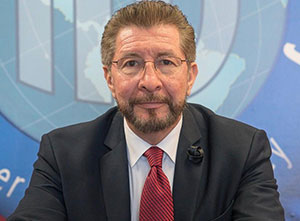The organization of American States (OAS) at a crossroads; either it defends democracy or it disappears

By: Carlos Sánchez Berzaín - 03/07/2025
Share:
The Organization of American States (OAS), the most important regional organization created with the objective “to be a political forum for peace-keeping, security, and for the promotion and defense of democracy and human rights,” is now confronted with an existential crisis of either fulfilling its objectives and principles in defense of democracy and human rights, or disappear.
The OAS was created on 30 April of 1948 with “the essential objectives of strengthening the continent's peace and security, promote, and consolidate democracy, promote human rights, back social and economic development favoring sustainable growth in America.” On 11 September of 2001, it approved the Interamerican Democratic Charter establishing that “peoples in the Americas have the right to democracy and their governments have the obligation of promoting and defending it. Democracy is essential for the social, political, and economic development of the peoples from the Americas.”
The first Americas' Summit of 1994, hailed the start of a period of OAS's optimism and efficiency that culminated with the signing of the Interamerican Democratic Charter on 11 September of 2001, the same day the U.S. was attacked by terrorists inside its territory. In the decade of the 90's of last century, all governments in the Americas were democratic, except Cuba whose regime was agonizing in its “special period.”
The arrival of Hugo Chavez to Venezuela's presidency in 1999, signaled the immediate aid, rescue, and recovery of Cuba's dictatorship, and allowed for the creation of a group led by Chavez and comprised by Fidel Castro and Luis Ignacio da Silva. The paradox for democracy in the Americas is that on 11 September of 2001, while the Interamerican Democratic Charter was being approved with the aim that the hemisphere be wholly, completely, and sustainably democratic, a terrorist attack against the U.S. was taking place, an attack that would change U.S. foreign policy, with a sole concentration on wars against terrorism and a progressive abandonment of Latin America.
What followed was the dissipation of the democratic impetus and the unprecedented creation and organization of an anti-democratic bloc with Hugo Chavez as the fundraiser with Venezuelan oil moneys, Fidel Castro as the know how dictatorial/criminal manager, and Lula as the political/laborer unions operator.
The de-stabilization promoted by the Chavez, Castro, Lula group operated at the OAS to remove Miguel Angel Rodriguez, former President of Costa Rica, who -two weeks after being elected OAS Secretary General- was forced to resign with accusations of corruption, something that he was later cleared from. The effects were new elections at the OAS, something that 21st Century Socialism manipulated with five ties between Mexican Luis Ernesto Derbez and its candidate Jose Miguel Insulza.
With the control of votes from Caribbean States through “Accords for Oil Deliveries” now known as Petrocaribe, Chavez, Castro, Lula were able to get 17 out of the 34 votes needed to promote Insulza. Petrocaribe was a system of exchanging votes at international organizations, such as the OAS, for oil. Bribery with the label of "cooperation" and "anti-imperialism. This is how Insulza was elected as Secretary General of the OAS and in his 10-year tenure from 2005 to 2015, all principles and standards of the OAS were ignored, and the expansion of dictatorships was promoted and supported.
The OAS, with Luis Almagro as its Secretary General, recovered the application of its principles and openly declared Cuba, Venezuela, and Nicaragua, as dictatorships, although he kept quite as to Bolivia. There were actions in favor of democracy and the identification of dictatorships, and there were some changes in the membership of the Interamerican Court of Human Rights that had been penetrated by 21st Century Socialism operators, but in spite of it all, dictatorships continue to exist.
The OAS is the reflection of the foreign policy of its member States, it is the reflection of dictatorships and para-dictatorial governments that operate with the votes from Caribbean States to obtain a majority voting, sustain dictatorships, violate human rights, and enjoy impunity. Those votes and that foreign policy have nothing to do with the interests and principles of States represented, but have a lot to do with the region's dictatorships, and extra-continental dictatorships as China, Iran, and Russia.
This is the objective reality that has been articulated by the U.S. through its Deputy Secretary of State Christian Landau at the recent general assembly of the OAS, expressing: "if this organization is not willing, or is not capable of, responding or remediating this situation wherein a regime openly defies international standards and threatens the territorial integrity of its neighbor State, we must then ask ourselves what is the objective of the organization" . . . "friendship is a two-way affair". . . “it is time for the OAS to show results. . . . we would like for this organization to be part of the solution and not the problem. . ."
Álea iacta est (sic choices have been cast); either the OAS defends democracy, or it disappears along with the dictatorships it sustains.
*Lawyer & Political Scientist. Director of the Interamerican Institute for Democracy.
Translation from Spanish by Edgar L. Terrazas
«The opinions published herein are the sole responsibility of its author».